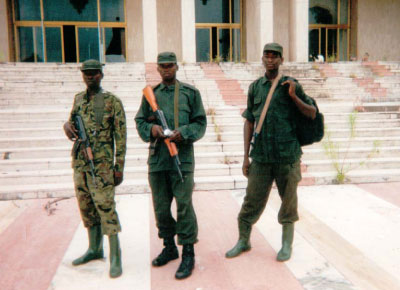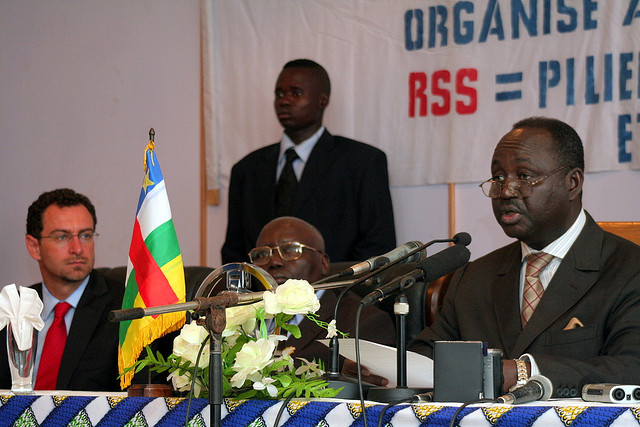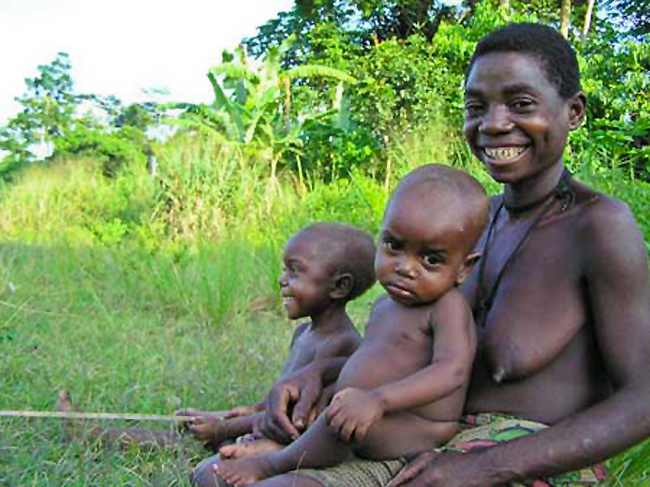|
Movement For The Liberation Of The Congo
The Movement for the Liberation of the Congo (french: Mouvement de Libération du Congo, or MLC) is a political party in Democratic Republic of the Congo. Formerly a rebel group operating in the Democratic Republic of Congo that fought the government throughout the Second Congo War, it subsequently took part in the transitional government and is one of the main opposition parties. Rebel years During the war, the MLC was backed by the government of Rwanda and controlled much of the north of the country, in particular the province of Équateur. It was led by former businessman, Jean-Pierre Bemba, who became vice-president following the 2002 Luanda Agreement. The headquarters of the MLC was located in the town of Gbadolite. The group was the primarily supported by Uganda during the war, while the rival Rally for Congolese Democracy (RCD) was dominated by Rwanda. The Movement for the Liberation of the Congo is the main suspect for perpetrating Effacer le tableau, an ethnic cle ... [...More Info...] [...Related Items...] OR: [Wikipedia] [Google] [Baidu] |
Jean-Pierre Bemba
Jean-Pierre Bemba Gombo (born 4 November 1962) is a politician in the Democratic Republic of the Congo. He was one of four Vice-Presidents of the Democratic Republic of the Congo, vice-presidents in the transitional government of the Democratic Republic of the Congo from 17 July 2003 to December 2006. Bemba also leads the Movement for the Liberation of the Congo (MLC), a Rebellion, rebel group turned political party. He received the second-highest number of votes in the 2006 Democratic Republic of the Congo general election, 2006 presidential election. In January 2007 he was elected to the Senate (Democratic Republic of the Congo), Senate. He was arrested near Brussels on 24 May 2008 on an arrest warrant issued by the International Criminal Court (ICC).International Criminal Court (24 May 2008). Jean-Pierre Bemba Gombo arrested for crimes allegedly committed in the Central African Republic''. Retrieved on 25 May 2008. He was originally charged with three counts of crime again ... [...More Info...] [...Related Items...] OR: [Wikipedia] [Google] [Baidu] |
Équateur (former Province)
Équateur (French for "Equator") was a province in the northwest of the Belgian Congo and the successor Republic of the Congo, now known as Democratic Republic of the Congo. It had its origins in the Équateur District of the Congo Free State, the private property of King Leopold II of Belgium. It was upgraded to the status of a province in 1917. Between 1933 and 1947 it was named Coquilhatville. In 1962 it was divided into three smaller provinces, but there were recombined in 1966. Équateur was one of the eleven provinces of the Democratic Republic of the Congo until 2015, when it was split into the new, smaller Équateur province, as well as the Tshuapa, Mongala, Nord-Ubangi and Sud-Ubangi provinces. Located in the north of the country, the province bordered the Republic of the Congo to the west, the Central African Republic to the north, to the east the Orientale province, and to the south the Kasai-Oriental, Kasai-Occidental, and Bandundu provinces. The word "Équ ... [...More Info...] [...Related Items...] OR: [Wikipedia] [Google] [Baidu] |
Crimes Against Humanity
Crimes against humanity are widespread or systemic acts committed by or on behalf of a ''de facto'' authority, usually a state, that grossly violate human rights. Unlike war crimes, crimes against humanity do not have to take place within the context of war, and apply to widespread practices rather than acts committed by individuals. Although crimes against humanity apply to acts committed by or on behalf of authorities, they need not be official policy, and require only tolerance rather than explicit approval. The first prosecution for crimes against humanity took place at the Nuremberg trials. Initially being considered for legal use, widely in international law, following the Holocaust a global standard of human rights was articulated in the Universal Declaration of Human Rights (1948). Political groups or states that violate or incite violation of human rights norms, as found in the Declaration, are an expression of the political pathologies associated with crimes against ... [...More Info...] [...Related Items...] OR: [Wikipedia] [Google] [Baidu] |
Brussels
Brussels (french: Bruxelles or ; nl, Brussel ), officially the Brussels-Capital Region (All text and all but one graphic show the English name as Brussels-Capital Region.) (french: link=no, Région de Bruxelles-Capitale; nl, link=no, Brussels Hoofdstedelijk Gewest), is a region of Belgium comprising 19 municipalities, including the City of Brussels, which is the capital of Belgium. The Brussels-Capital Region is located in the central portion of the country and is a part of both the French Community of Belgium and the Flemish Community, but is separate from the Flemish Region (within which it forms an enclave) and the Walloon Region. Brussels is the most densely populated region in Belgium, and although it has the highest GDP per capita, it has the lowest available income per household. The Brussels Region covers , a relatively small area compared to the two other regions, and has a population of over 1.2 million. The five times larger metropolitan area of Bruss ... [...More Info...] [...Related Items...] OR: [Wikipedia] [Google] [Baidu] |
Ange-Félix Patassé
Ange-Félix Patassé (January 25, 1937 – April 5, 2011) was a Central African politician who was President of the Central African Republic from 1993 until 2003, when he was deposed by the rebel leader François Bozizé in the 2003 coup d'état. Patassé was the first president in the CAR's history (since 1960) to be chosen in what was generally regarded as a fairly democratic election (1993) in that it was brought about by donor pressure on President André Kolingba and assisted by the United Nations Electoral Assistance Unit. He was chosen a second time in a fair election (1999) as well. However, during his first term in office (1993–1999), three military mutinies in 1996–1997 led to increasing conflict between so-called "northerners" (like Patassé) and "southerners" (like his predecessor President André Kolingba). Expatriate mediators and peacekeeping troops were brought in to negotiate peace accords between Patassé and the mutineers and to maintain law and order. ... [...More Info...] [...Related Items...] OR: [Wikipedia] [Google] [Baidu] |
François Bozizé
François Bozizé Yangouvonda (born 14 October 1946) is a Central African politician who was President of the Central African Republic from 2003 to 2013. Bozizé rose to become a high-ranking army officer in the 1970s, under the rule of Jean-Bédel Bokassa. After Bokassa was ousted, Bozizé served in the government as Minister of Defense from 1979 to 1981 and as Minister of Information from 1981 to 1982. He participated in a failed 1982 coup attempt against President André Kolingba and subsequently fled the country. Years later, he served as Army Chief of Staff under President Ange-Félix Patassé, but he began a rebellion against Patassé in 2001. Bozizé's forces captured the capital, Bangui, in March 2003, while Patassé was outside the country, and Bozizé took power, ushering in a transitional period of government. He won the March–May 2005 presidential election in a second round of voting, and he was re-elected in the January 2011 presidential election, winning t ... [...More Info...] [...Related Items...] OR: [Wikipedia] [Google] [Baidu] |
Central African Republic
The Central African Republic (CAR; ; , RCA; , or , ) is a landlocked country in Central Africa. It is bordered by Chad to the north, Sudan to the northeast, South Sudan to the southeast, the DR Congo to the south, the Republic of the Congo to the southwest, and Cameroon to the west. The Central African Republic covers a land area of about . , it had an estimated population of around million. , the Central African Republic is the scene of a civil war, ongoing since 2012. Most of the Central African Republic consists of Sudano-Guinean savannas, but the country also includes a Sahelo- Sudanian zone in the north and an equatorial forest zone in the south. Two-thirds of the country is within the Ubangi River basin (which flows into the Congo), while the remaining third lies in the basin of the Chari, which flows into Lake Chad. What is today the Central African Republic has been inhabited for millennia; however, the country's current borders were established by F ... [...More Info...] [...Related Items...] OR: [Wikipedia] [Google] [Baidu] |
International Criminal Court
The International Criminal Court (ICC or ICCt) is an intergovernmental organization and International court, international tribunal seated in The Hague, Netherlands. It is the first and only permanent international court with jurisdiction to prosecute individuals for the International criminal law, international crimes of genocide, crimes against humanity, war crimes and the crime of aggression. It is distinct from the International Court of Justice, an United Nations System, organ of the United Nations that hears disputes between states. While praised as a major step towards justice, and as an innovation in international law and human rights, the ICC has faced a number of criticisms from governments and civil society, including objections to its jurisdiction, accusations of bias, Eurocentrism and racism, questioning of the fairness of its case-selection and trial procedures, and doubts about its effectiveness. History The establishment of an International court, international ... [...More Info...] [...Related Items...] OR: [Wikipedia] [Google] [Baidu] |
Pygmy Peoples
In anthropology, pygmy peoples are ethnic groups whose average height is unusually short. The term pygmyism is used to describe the phenotype of endemic short stature (as opposed to disproportionate dwarfism occurring in isolated cases in a population) for populations in which adult men are on average less than tall. The term is primarily associated with the African Pygmies, the hunter-gatherers of the Congo Basin (comprising the Bambenga, Bambuti and Batwa). The terms "Asiatic Pygmies" and "Oceanian pygmies" have been used to describe the Negrito populations of Southeast Asia and Australo-Melanesian peoples of short stature. The Taron people of Myanmar are an exceptional case of a "pygmy" population of East Asian phenotype. Etymology The term ''pygmy'', as used to refer to diminutive people, derives from Greek πυγμαῖος ''pygmaios'' via Latin ''Pygmaei'' (sing. ''Pygmaeus''), derived from πυγμή – meaning a short forearm cubit, or a measure o ... [...More Info...] [...Related Items...] OR: [Wikipedia] [Google] [Baidu] |
Ethnic Cleansing
Ethnic cleansing is the systematic forced removal of ethnic, racial, and religious groups from a given area, with the intent of making a region ethnically homogeneous. Along with direct removal, extermination, deportation or population transfer, it also includes indirect methods aimed at forced migration by coercing the victim group to flee and preventing its return, such as murder, rape, and property destruction. It constitutes a crime against humanity and may also fall under the Genocide Convention, even as ''ethnic cleansing'' has no legal definition under international criminal law. Many instances of ethnic cleansing have occurred throughout history; the term was first used by the perpetrators as a euphemism during the Yugoslav Wars in the 1990s. Since then, the term has gained widespread acceptance due to journalism and the media's heightened use of the term in its generic meaning. Etymology An antecedent to the term is the Greek word (; lit. "enslavement"), which was ... [...More Info...] [...Related Items...] OR: [Wikipedia] [Google] [Baidu] |
Effacer Le Tableau
''Effacer le tableau'' (, literally "erase the board" or "clean the slate") was the operational name given to the systematic extermination of the Bambuti pygmies by rebel forces in the Democratic Republic of the Congo (DRC). History The extermination was carried out by soldiers from the Movement for the Liberation of Congo (MLC), who became known to locals as ''les effaceurs'' ("the erasers"), and troops from the Rally for Congolese Democracy (RCD-N). The primary objective of ''Effacer le tableau'' was the territorial conquest of the North Kivu province of the DRC and ethnic cleansing of Pygmies from the Congo's eastern region whose population numbered 90,000 by 2002. The Bambuti were targeted specifically as the rebels considered them "subhuman", and it was believed by the rebels that the flesh of the Bambuti held " magical powers". There were also reports of cannibalism being widespread. It is estimated 60,000 to 70,000 Pygmy were killed in the campaign. In March 2016, ... [...More Info...] [...Related Items...] OR: [Wikipedia] [Google] [Baidu] |





